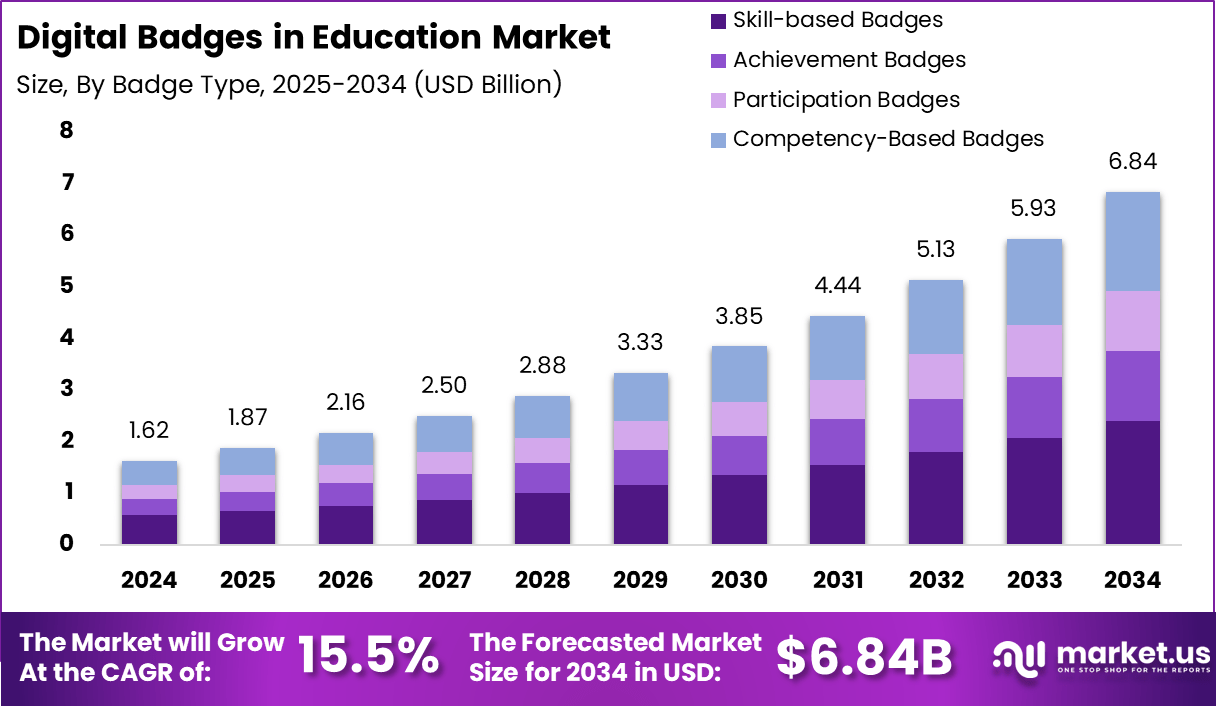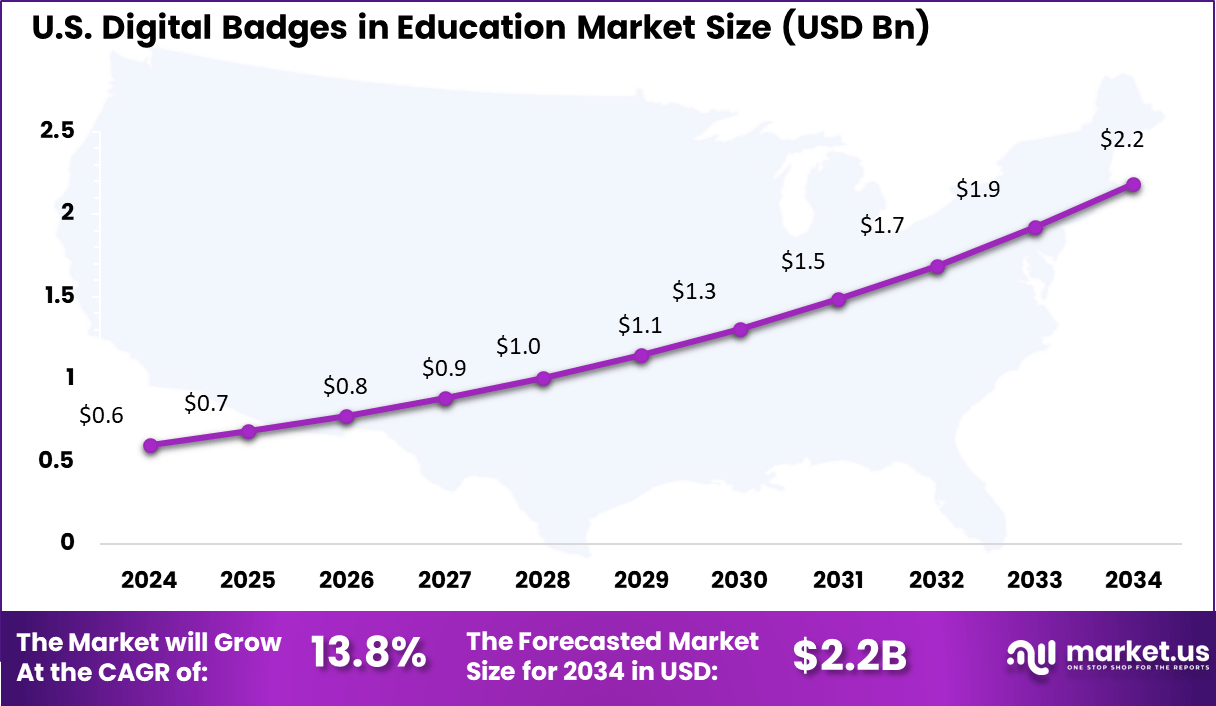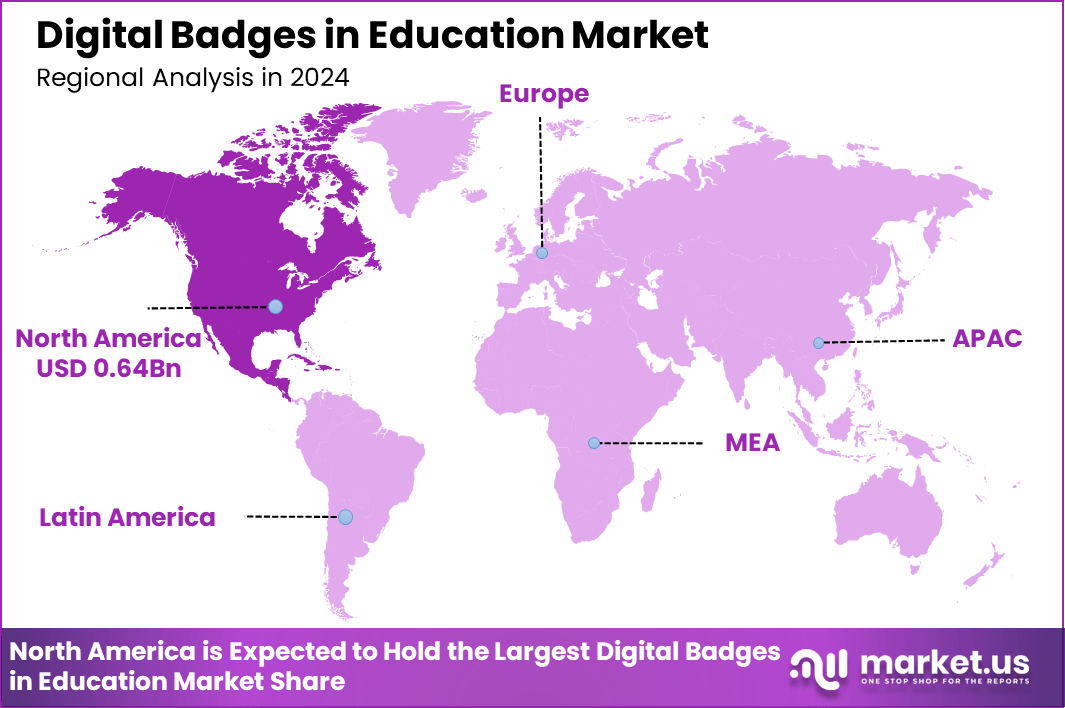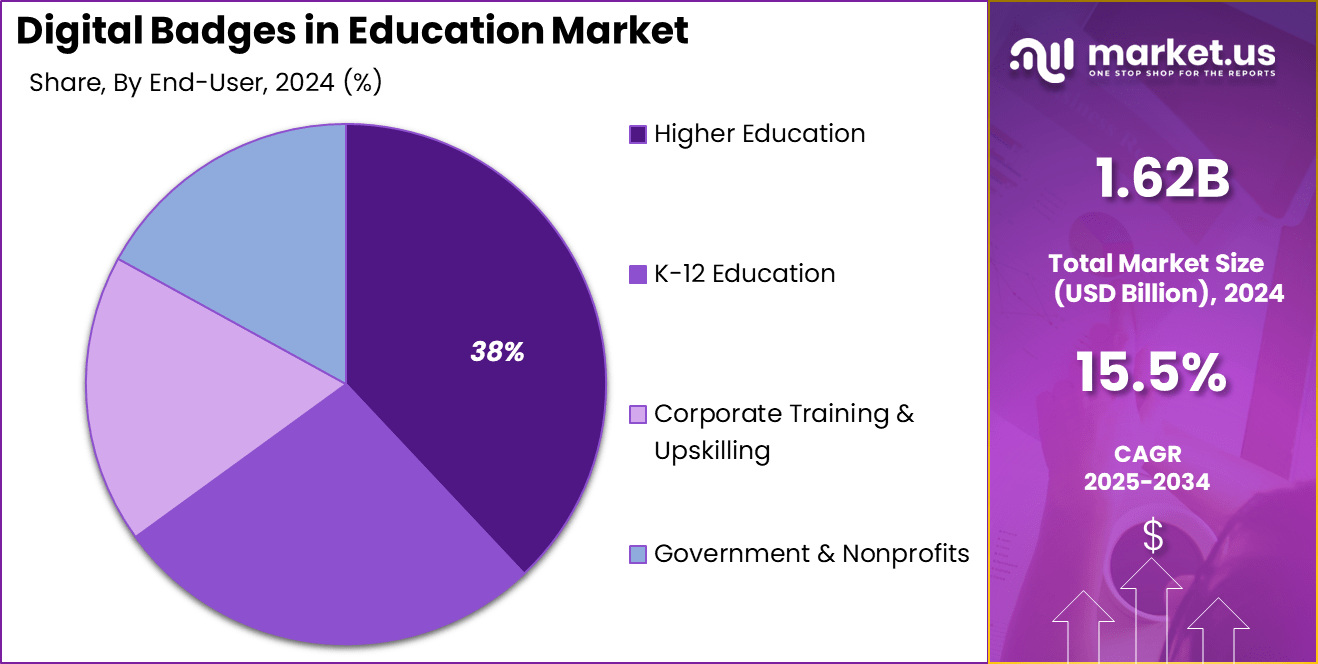Digital Badges in Education Market Size Analysis Report By Badge Type (Skill-based Badges, Achievement Badges, Participation Badges, Competency-Based Badges), By End-User (K-12 Education, Higher Education, Corporate Training & Upskilling, Government & Nonprofits), Region and Companies – Industry Segment Outlook, Market Assessment, Competition Scenario, Trends and Forecast 2025-2034
- Published date: April 2025
- Report ID: 145991
- Number of Pages: 389
- Format:
-
keyboard_arrow_up
Quick Navigation
Report Overview
The Global Digital Badges in Education Market size is expected to be worth around USD 6.84 Billion By 2034, from USD 1.62 billion in 2024, growing at a CAGR of 15.5% during the forecast period from 2025 to 2034. In 2024, North America held a dominant market position, capturing more than a 40% share, holding USD 0.64 Billion revenue.
Digital badges in education represent a digital form of recognition for achievements or skills gained, typically through online learning platforms. These badges are issued by educational institutions, organizations, or learning platforms as a credential that certifies an individual’s accomplishments or competencies.
The market for digital badges in education is projected to grow significantly, driven by the expanding adoption of e-learning and online certification programs. In 2025, the market is expected to reach a substantial size, with a continued growth trajectory influenced by the rising trend of lifelong learning and the increasing relevance of micro-credentialing in professional development.

The demand for digital badges is fueled by their ability to transparently showcase and verify skills and achievements on digital platforms, making them highly valuable for job seekers in a competitive market. Educational institutions are also integrating digital badges into their programs to offer more granular recognition of student achievements.
Advancements in Learning Management Systems (LMS) and integration with social media platforms have facilitated the wider adoption and distribution of digital badges. This technological progression supports personalized learning paths and provides institutions with better tools for tracking and recognizing student progress.
The real impact of U.S. tariffs on the Learning Management System (LMS) market becomes evident when analyzing the full technology stack supporting modern platforms. Today’s LMS solutions rely on AI-powered content delivery, immersive VR-based training modules, and real-time analytics dashboards – all of which depend heavily on high-performance hardware.
Many of these systems are powered by GPUs, servers, and networking devices, which often include components imported from China. These components are now facing a 25% tariff, significantly increasing the cost of deployment and maintenance
There is a noticeable trend towards incorporating digital badges in routine educational and professional development activities. This includes their use in internal training programs by corporations and by online learning platforms that cater to professional development needs. The technology behind digital badges has evolved, with platforms increasingly using blockchain to ensure the security and verifiability of these credentials.
Key Takeaways
- The global digital badges in education market is on a steep growth path. Valued at USD 1.62 Billion in 2024, it is projected to expand to approximately USD 6.84 Billion by 2034, growing at a compelling CAGR of 15.5%.
- In 2024, North America captured over 40% of the global market, contributing USD 0.64 Billion in revenue.
- The United States alone accounted for USD 0.6 Billion in 2024 and is expected to reach around USD 2.2 Billion by 2034, growing steadily at a CAGR of 13.8%.
- The Skill-based Badges segment held a leading market share of more than 35% in 2024, as employers and institutions increasingly favor outcome-based learning and certification models.
- Among end-users, the Higher Education segment dominated with over 38% share in 2024. Colleges and universities are integrating digital badges into both academic and extracurricular frameworks, aligning them with industry requirements.
Analysts’ Viewpoint
Investing in digital badge technology presents opportunities for educational technology companies and institutions looking to add value to their certification programs. For businesses, implementing digital badges can enhance recruitment processes and employee engagement strategies by clearly recognizing and rewarding skills and achievements.
The regulatory landscape for digital badges is still developing, with a focus on ensuring the authenticity and standardization of badges across platforms to prevent fraud and enhance their acceptance by employers across various industries.
Moreover, the market is influenced by several key factors:
- The need for continuous learning and professional development across various industries.
- The growing importance of skill verification in professional settings.
- Advances in technology that facilitate the issuance, management, and verification of digital badges.
US Tariff Impact
The impact of US tariffs on the Digital Badges in Education market can be summarized through several key points that outline both challenges and strategic considerations for stakeholders:
- Increased Costs: Tariffs may lead to increased operational and production costs for companies that rely on imported goods and services crucial to digital badge systems. This includes software or hardware that may be integral to the issuing and management of digital badges.
- Supply Chain Disruptions: Companies involved in the production and support of digital badges might face disruptions in their supply chains. This could necessitate the search for alternative suppliers or increase the cost of inputs, as tariffs affect imported goods essential to their operations.
- Market Uncertainty: The uncertainty surrounding tariffs and trade policies can impact investment decisions within the sector. Companies might delay or reconsider investments in new digital badge initiatives due to uncertain economic conditions and potential cost increases.
- Competitive Disadvantage: U.S.-based companies may find themselves at a competitive disadvantage compared to their international counterparts if tariffs lead to higher prices for essential components. This might affect the pricing of services related to digital badges, potentially making them less competitive in global markets.
- Strategic Adjustments: Companies might need to make strategic adjustments, such as finding new sourcing strategies or absorbing additional costs to maintain profitability. Decisions could include altering the pricing models for educational institutions that use digital badges or reconsidering the financial structuring of contracts with suppliers and clients to mitigate the impact of tariffs.
US Market Growth
The US Digital Badges in Education Market is valued at approximately USD 0.6 Billion in 2024 and is predicted to increase from USD 0.7 Billion in 2025 to approximately USD 2.2 Billion by 2034, projected at a CAGR of 13.8% from 2025 to 2034.
This substantial growth can be attributed to a convergence of educational needs and technological advancements. Firstly, the U.S. is leading in the digital badges market primarily due to its advanced digital infrastructure and the widespread adoption of e-learning technologies across its educational institutions and corporate training programs.
The U.S. has a robust ecosystem of tech companies and educational technology startups that are continually innovating and expanding the capabilities of digital badge platforms. These innovations include integration with Learning Management Systems (LMS), social media platforms, and mobile applications, making digital badges more accessible and verifiable.
Moreover, there is a growing emphasis on lifelong learning and professional development in the U.S. workforce, which supports the expansion of the digital badges market. Employers across various sectors are increasingly recognizing digital badges as valid representations of a candidate’s skills and competencies.
This recognition is fueled by the market’s demand for specific skill sets and the flexibility digital badges offer in upskilling and reskilling employees. The adaptability of digital badges to various learning paths and career advancements makes them particularly appealing in the dynamic U.S. job market.

North America Market Size
In 2024, North America held a dominant market position in the Digital Badges in Education sector, capturing more than a 40% share and generating USD 0.6 billion in revenue. This leadership can be primarily attributed to the region’s advanced digital infrastructure and the strong presence of major technology firms that are pioneers in educational technologies.
North American educational institutions and corporations are early adopters of digital innovations, integrating digital badges extensively into e-learning platforms and professional development programs. The market’s expansion in North America is also supported by a cultural emphasis on continuous learning and skill development, which aligns well with the flexibility and capability of digital badges to verify and showcase professional and educational achievements.
Furthermore, the regulatory environment in North America, particularly in the United States and Canada, often supports the development and acceptance of digital credentials, making it easier for educational institutions and businesses to implement and recognize these badges.
In comparison, other regions like Europe, APAC, Latin America, and the Middle East and Africa are also recognizing the benefits of digital badges. Europe follows closely due to its strong emphasis on vocational training and professional development. APAC shows significant growth potential with its rapidly expanding e-learning platforms and increasing focus on professional certifications.

By Badge Type Analysis
In 2024, the Skill-based Badges segment held a dominant market position, capturing more than a 35% share. This leadership can be primarily attributed to the growing emphasis on practical skills in the job market. Employers are increasingly looking for verifiable evidence of specific skills beyond traditional degrees or certifications.
Skill-based badges fulfill this need by providing a clear and credible representation of an individual’s abilities in particular areas such as coding, digital marketing, or graphic design. The rise of online platforms offering specialized courses that culminate in the awarding of digital badges has also propelled this segment.
Platforms like Coursera and Udemy offer a plethora of skill-based learning paths that are directly linked to industry needs, making their badges highly valued by both learners and employers. These badges not only help individuals stand out in a competitive job market but also encourage continuous professional development.
Moreover, the integration of skill-based badges into Learning Management Systems (LMS) used by corporations for employee training further underscores their value. Companies are leveraging these badges within their training programs to better track employee progress, identify skill gaps, and promote upskilling.
This practical utility in both educational and professional settings continues to drive the segment’s growth, ensuring that skill-based badges remain a significant part of the digital badge ecosystem. The increasing reliance on remote work and digital collaboration has also highlighted the importance of specific skill sets that can be effectively demonstrated through badges.
By End-User Analysis
In 2024, the Higher Education segment held a dominant market position, capturing more than a 38% share of the digital badges market. This leading role is driven by several key factors that align with the evolving needs of modern educational environments and the broader employment landscape.
Higher education institutions are increasingly adopting digital badges to complement traditional degrees, offering students tangible proof of specific skills and competencies that are critical in the job market. The integration of digital badges into higher education curricula is largely in response to the demand from employers for graduates who possess not only academic knowledge but also practical skills.
Universities and colleges use these badges to highlight student achievements in areas like technology, leadership, and critical thinking, which are often pursued alongside formal degree programs. This approach helps students differentiate themselves in competitive job markets.
Moreover, higher education institutions are leveraging digital badges as a strategic tool to enhance their educational offerings. By providing badges for shorter, specialized courses, these institutions attract a broader range of learners, including working professionals seeking upskilling opportunities without the time or financial commitment required for a degree.

Key Market Segments
By Badge Type
- Skill-based Badges
- Achievement Badges
- Participation Badges
- Competency-Based Badges
By End-User
- K-12 Education
- Higher Education
- Corporate Training & Upskilling
- Government & Nonprofits
Key Regions and Countries
- North America
- US
- Canada
- Europe
- Germany
- France
- The UK
- Spain
- Italy
- Rest of Europe
- Asia Pacific
- China
- Japan
- South Korea
- India
- Australia
- Singapore
- Rest of Asia Pacific
- Latin America
- Brazil
- Mexico
- Rest of Latin America
- Middle East & Africa
- South Africa
- Saudi Arabia
- UAE
- Rest of MEA
Driver
Growing Demand for Skill Verification and Continuous Learning
The primary driver for the Digital Badges in Education market is the increasing demand for verifiable and portable proof of skills and achievements. This trend is largely fueled by the rise of e-learning platforms and online courses that offer specialized training across various fields. Digital badges cater to the needs of a modern workforce that values continuous learning and skill development.
These badges provide a tangible way for individuals to demonstrate their learning and competencies in a way that is easily shareable and verifiable by potential employers. This demand is further amplified by the evolving job market, where skills are rapidly changing, making lifelong learning and adaptability crucial traits for career progression.
Restraint
Lack of Standardization and Wide Acceptance
One significant restraint in the market is the lack of standardization across digital badging platforms, which can lead to issues in badge acceptance and recognition across different industries and educational institutions.
The absence of a uniform standard can undermine the credibility of digital badges and make it challenging for employers to assess the value and authenticity of the skills and achievements they represent. This challenge is compounded by the diverse array of issuing bodies, each with their own criteria and standards for awarding badges, which can confuse both badge earners and potential employers.
Opportunity
Integration with Workforce Development and Higher Education
The integration of digital badges with workforce development programs and higher education presents a significant opportunity. As educational institutions and employers increasingly recognize the value of micro-credentials, digital badges are becoming integral to bridging the gap between formal education and practical, employable skills.
This trend is supported by the growing number of institutions adopting badge programs to supplement traditional degrees, offering learners a way to acquire and demonstrate job-ready skills that are directly applicable in the workplace. Furthermore, the push towards digital transformation in education accelerates the adoption of such technologies, opening up new pathways for lifelong learning and professional development.
Challenge
Ensuring Security and Integrity of Badges
A major challenge facing the digital badges market is ensuring the security and integrity of the badges issued. As the adoption of digital badges increases, so does the need for robust systems to prevent fraud, such as the issuing of counterfeit badges.
Ensuring the authenticity of digital badges requires sophisticated technology, such as blockchain, which can provide a secure and transparent method for issuing and verifying badges. Moreover, there is a need for ongoing education and awareness to help stakeholders understand the value and potential of digital badges, as well as to build trust in their legitimacy as credentials.
Growth Factors
The Digital Badges in Education market is experiencing substantial growth driven by several key factors. One primary driver is the increasing adoption of online learning platforms which have become essential, especially in the context of the ongoing digital transformation in education.
As traditional educational pathways are complemented or replaced by digital and remote learning systems, digital badges serve as crucial tools in acknowledging a wide array of competencies and achievements. They offer a tangible way to recognize both small-scale learning milestones and major academic achievements across various learning environments.
Moreover, the growing emphasis on continuous professional development and the rising demand for skill-specific education over traditional degrees enhance the market’s expansion. Employers are increasingly valuing micro-credentials, which digital badges effectively represent, for their relevance in specific professional contexts.
Emerging Trends
Emerging trends in the digital badges market include the integration of advanced technologies such as blockchain and artificial intelligence. These technologies enhance the security and credibility of digital badges, making them more reliable and thus more accepted across educational and professional domains.
Blockchain, for instance, offers immutable records of achievements that can be verified independently, which is crucial for the authenticity and long-term tracking of educational credentials. Social media platforms and mobile applications are also becoming significant channels for the dissemination and sharing of digital badges.
These platforms facilitate wider recognition and networking opportunities for badge holders, enhancing professional visibility and career development opportunities. The ability to display and share badges on social networks like LinkedIn is particularly valuable as it allows professionals to substantiate their skills and educational achievements in a public and easily accessible manner.
Business Benefits
From a business perspective, digital badges offer several benefits. For educational institutions and training providers, they represent a method to enhance engagement and motivation among learners. Digital badges help in mapping out learning pathways and providing learners with visible acknowledgments of their progress, which can boost learner retention and satisfaction.
For employers, digital badges make it easier to assess and understand the specific skills and competencies of potential hires or current employees, facilitating better recruitment and workforce development strategies. Furthermore, digital badges can significantly reduce the time and costs associated with the traditional certification process.
They allow for faster and more efficient recognition of learner achievements, which can be especially beneficial in fast-paced industries where continuous upskilling is required. The administrative burden on educational and training organizations is also lessened as digital badges can be issued and managed digitally at a lower cost compared to traditional methods.
Key Player Analysis
Accredible has emerged as a major innovator in the digital credentials space. In April 2023, it partnered with Cengage, a leading education technology company, to offer digital badges and microcredentials for students using the MindTap learning platform. These badges are awarded based on assessments and are designed to validate real-world skills such as Microsoft Office 365 proficiency.
Credly continues to be a dominant player by helping institutions and enterprises recognize skills through digital badges. Although there were no new acquisitions reported in 2024 so far, Credly’s platform has seen widespread adoption across universities, government agencies, and corporations. Its core strength lies in making skill-based learning more visible and meaningful.
Skillsoft is not only a major provider of corporate learning but also an active contributor to the credentialing ecosystem. In June 2023, the company launched a new initiative called the ChatGPT Learning Journey, aimed at preparing professionals for the future of AI integration in business.
Top Key Players in the Market
- Accredible
- Badgr
- Blackboard Inc.
- Canvas LMS (by Instructure)
- Certiport
- ClassLink
- Coursera
- Credly
- EdX
- Hootsuite
- IBM
- LinkedIn Learning Solutions
- Mozilla Foundation
- Open Badges (by IMS Global Learning Consortium)
- Pearson
- SAP
- Skillsoft
- Other Key Players
Recent Developments
- In October 2024, PMI introduced digital badges for all its foundation certifications. These badges, issued in partnership with Credly, provide professionals with a modern way to verify and display their achievements across various platforms.
- Accredible – In April 2023, Accredible partnered with Cengage to offer digital badging and microcredentials designed to bridge skills gaps for students using Cengage’s learning platform, MindTap. This partnership allows students to earn digital badges demonstrating proficiency in Microsoft Office 365, which they can then display on their digital resumes or LinkedIn profiles
Report Scope
Report Features Description Market Value (2024) USD 1.62 Bn Forecast Revenue (2034) USD 6.84 Bn CAGR (2025-2034) 15.5% Base Year for Estimation 2024 Historic Period 2020-2023 Forecast Period 2025-2034 Report Coverage Revenue forecast, AI impact on market trends, Share Insights, Company ranking, competitive landscape, Recent Developments, Market Dynamics and Emerging Trends Segments Covered By Badge Type (Skill-based Badges, Achievement Badges, Participation Badges, Competency-Based Badges), By End-User (K-12 Education, Higher Education, Corporate Training & Upskilling, Government & Nonprofits) Regional Analysis North America – US, Canada; Europe – Germany, France, The UK, Spain, Italy, Russia, Netherlands, Rest of Europe; Asia Pacific – China, Japan, South Korea, India, New Zealand, Singapore, Thailand, Vietnam, Rest of APAC; Latin America – Brazil, Mexico, Rest of Latin America; Middle East & Africa – South Africa, Saudi Arabia, UAE, Rest of MEA Competitive Landscape Accredible, Badgr, Blackboard Inc., Canvas LMS (by Instructure), Certiport, ClassLink, Coursera, Credly, EdX, Hootsuite, IBM, LinkedIn Learning Solutions, Mozilla Foundation, Open Badges (by IMS Global Learning Consortium), Pearson, SAP, Skillsoft, Other Key Players Customization Scope Customization for segments, region/country-level will be provided. Moreover, additional customization can be done based on the requirements. Purchase Options We have three license to opt for: Single User License, Multi-User License (Up to 5 Users), Corporate Use License (Unlimited User and Printable PDF)  Digital Badges in Education MarketPublished date: April 2025add_shopping_cartBuy Now get_appDownload Sample
Digital Badges in Education MarketPublished date: April 2025add_shopping_cartBuy Now get_appDownload Sample -
-
- Accredible
- Badgr
- Blackboard Inc.
- Canvas LMS (by Instructure)
- Certiport
- ClassLink
- Coursera
- Credly
- EdX
- Hootsuite
- IBM
- LinkedIn Learning Solutions
- Mozilla Foundation
- Open Badges (by IMS Global Learning Consortium)
- Pearson
- SAP
- Skillsoft
- Other Key Players












